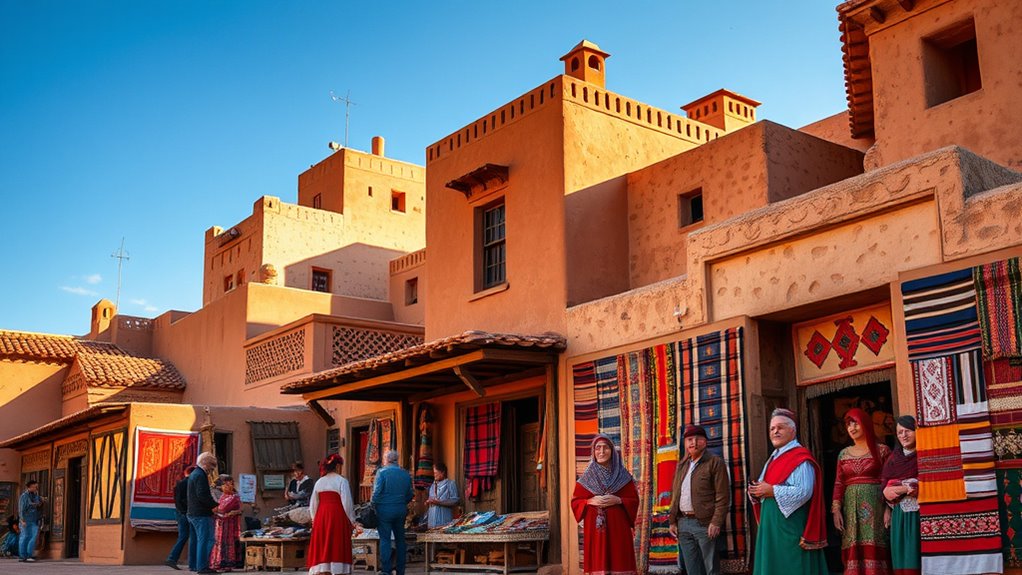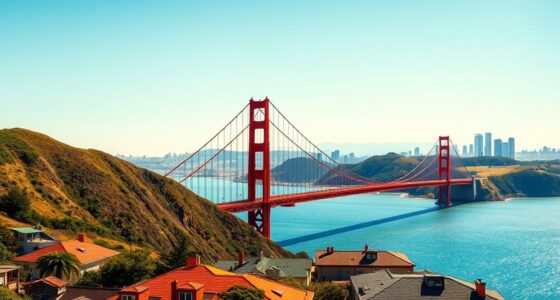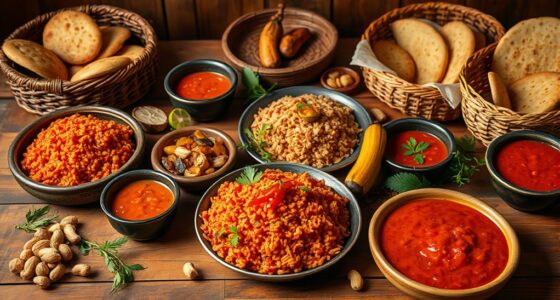The history and culture of the West trace back to early civilizations like Greece and Rome, shaping ideas of democracy, law, and engineering. Over time, medieval society, the Renaissance, and scientific breakthroughs transformed thought and art. The Age of Exploration expanded global connections, while the Enlightenment and revolutions promoted liberty and human rights. Today, Western societies are deeply interconnected through technology and trade, facing new challenges and opportunities. Exploring these stages reveals the roots of modern Western culture and innovation.
Key Takeaways
- Western history traces from ancient civilizations like Mesopotamia and Egypt to modern societies, shaping law, governance, and culture.
- The Renaissance, Reformation, and Enlightenment periods fostered artistic, scientific, and philosophical advancements that influence Western values today.
- Medieval Europe was characterized by feudal hierarchies and strong religious influence, with monasteries preserving knowledge through turbulent times.
- The Age of Exploration expanded Western influence globally, establishing trade routes, colonies, and cultural exchanges across continents.
- Modern Western society emphasizes global integration, technological innovation, and addressing challenges like climate change and economic disparities.
Ancient Foundations and Civilizations

Ancient civilizations laid the groundwork for Western history by developing key cultural, political, and technological innovations. You can see their influence in the establishment of writing systems like cuneiform in Mesopotamia and hieroglyphs in Egypt, which revolutionized record-keeping and communication. These societies also introduced early forms of governance, such as the Code of Hammurabi, shaping legal principles still relevant today. In Greece, you find the roots of democracy, philosophy, and scientific inquiry, while Rome contributed advanced engineering, law, and republican ideas that underpin Western political systems. These civilizations laid a solid foundation for future societies, fostering advancements in arts, governance, and technology that continue to shape the modern Western world. Their innovations created a cultural legacy that endures across centuries. Additionally, the development of early writing systems allowed for the preservation and transmission of knowledge, influencing education and scholarship throughout history.
Medieval Society and Religious Influence
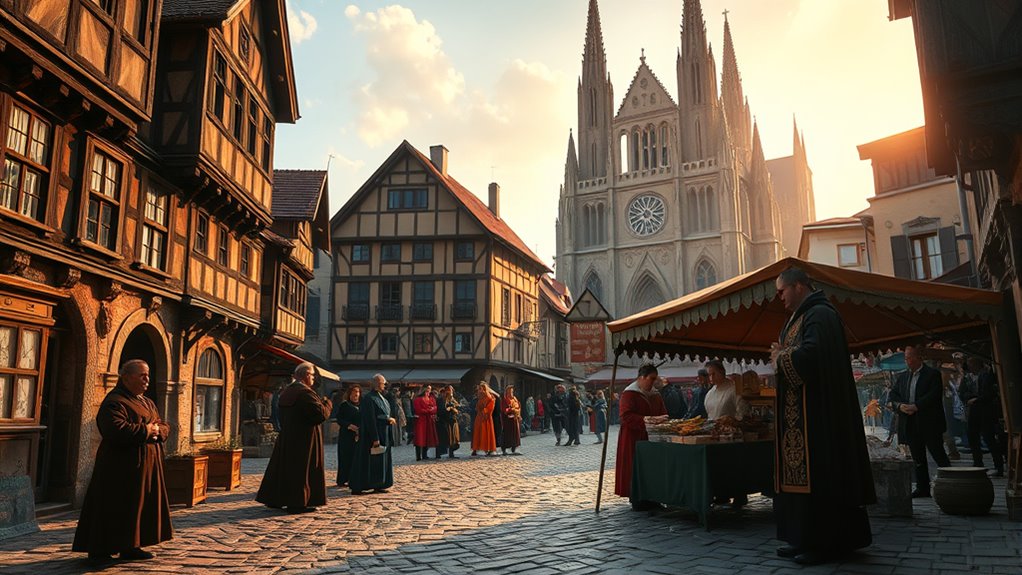
You see how the Church held immense power in medieval society, shaping daily life and political decisions. Feudal hierarchies reinforced social order, with lords and vassals relying heavily on religious authority. Religious conflicts, like the Crusades, transformed relationships between nations and faiths, leaving a lasting impact on European history. The influence of medieval anime movies also reflects the cultural importance of historical themes during this period.
Role of the Church
During the medieval period, the Church held a central role in shaping society and influencing daily life. You’d see it guiding morals, education, and politics, often intertwining faith with governance. The Church’s influence extended beyond spiritual matters into daily routines and social structures. It controlled vast land holdings, collected tithes, and dictated moral standards. Remote hackathons exemplify how modern collaboration can transcend traditional boundaries, fostering innovation in a virtual environment. You’d notice:
- The Church’s authority over kings and nobles
- Its role in education and preserving knowledge
- The power of monasteries as centers of learning
- Its influence on art, architecture, and cultural expression
You’d also witness how religious leaders shaped laws and societal norms, reinforcing the Church’s dominance in medieval Europe’s political and cultural landscape.
Feudal Hierarchies Structure
The feudal hierarchy in medieval society organized people into a strict social order, with each level serving specific roles and obligations. At the top, you had the king or monarch, holding ultimate authority and granting land to nobles. Below them, lords or nobles managed large estates and provided military service in exchange for land. Vassals, knights, and lesser nobles served these lords, offering protection and loyalty. Peasants or serfs worked the land, producing food and goods essential for the entire system. Religious influence intertwined deeply with this structure, as the Church held significant power, often owning land and influencing rulers. This hierarchy reinforced social stability, with everyone aware of their roles and responsibilities, shaping medieval society’s political, economic, and spiritual life. Additionally, the allocation of land and resources was often influenced by cost behavior analysis, ensuring the stability of the feudal economy and the obligations of each social class.
Religious Conflicts Impact
Religious conflicts played a pivotal role in shaping medieval society by fueling wars, political upheavals, and social divisions. These struggles often defined alliances, justified violence, and influenced daily life. You see, the Crusades aimed to reclaim holy lands but also intensified hostility between Christians and Muslims. The Investiture Controversy challenged church authority, leading to power struggles with monarchs. Heresies like Catharism threatened church unity, prompting brutal persecutions. Religious disputes also fueled internal conflicts, such as the Great Schism splitting the Catholic Church. Additionally, the influence of religious doctrines shaped educational and cultural developments during this period.
- Crusades expanded territorial and political influence
- Heresy persecutions led to social paranoia
- Religious leaders gained political power
- Conflict fueled cultural and scientific stagnation
Renaissance, Reformation, and Scientific Progress
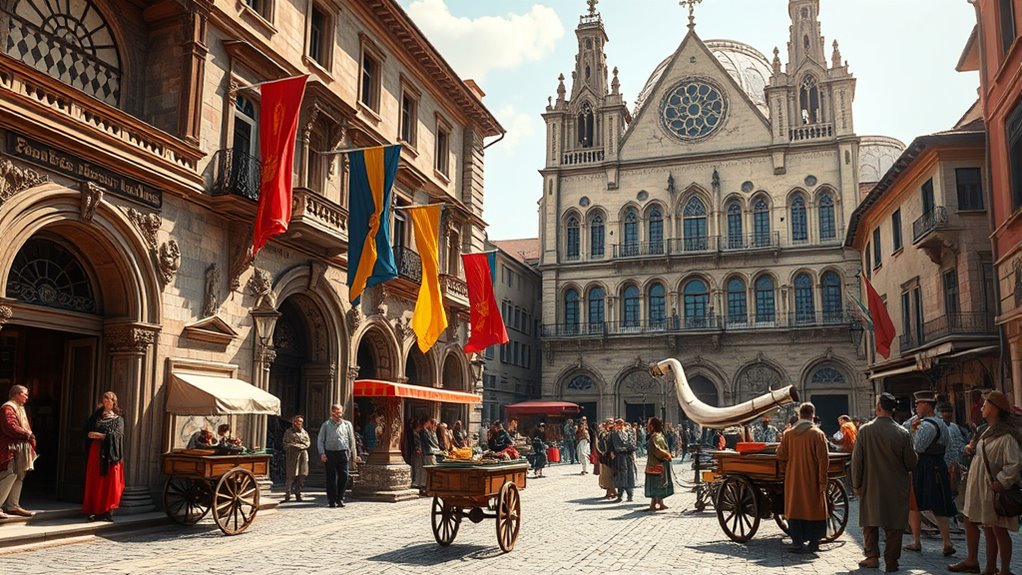
The Renaissance marks a vibrant period of cultural and intellectual revival that transformed Europe from the 14th to the 17th century. During this time, you witness a surge in art, literature, and scientific discoveries that challenge old traditions. Think of artists like Leonardo da Vinci and Michelangelo revolutionizing visual expression, while thinkers like Erasmus and Machiavelli reshape philosophy and politics. Scientific progress accelerates with figures like Copernicus and Galileo, who question the universe’s structure. The Reformation, sparked by Martin Luther, challenges the Catholic Church’s authority, leading to religious fragmentation and new Protestant denominations. Humanism takes center stage, emphasizing individual potential and classical learning. This period fuels curiosity, innovation, and a shift toward modern ways of thinking, setting the foundation for subsequent societal changes. Notably, the scientific advancements during this era are closely linked to scientific progress, which laid the groundwork for the modern scientific method and further exploration of natural phenomena.
Age of Exploration and Global Encounters
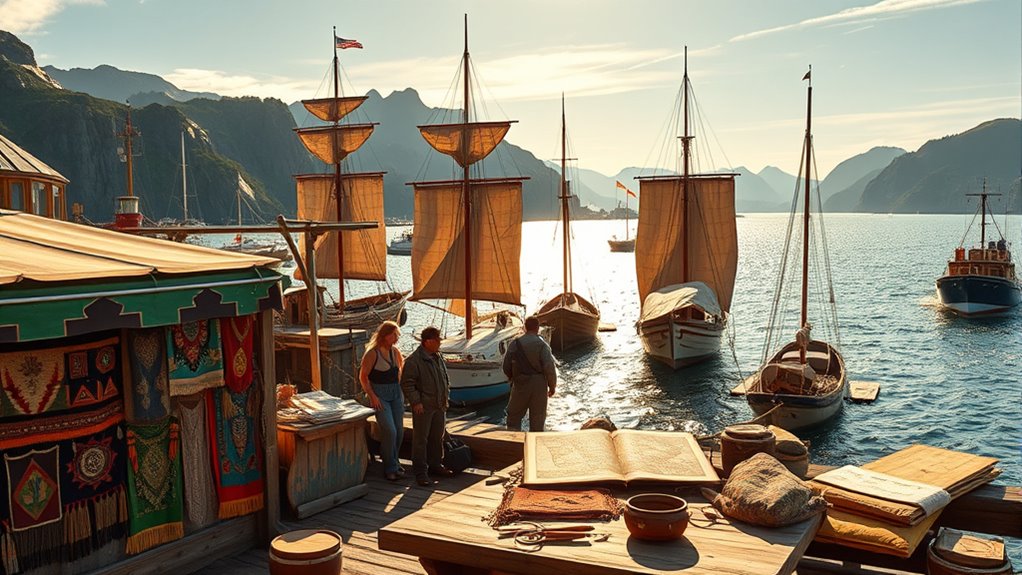
Have you ever wondered how Europeans expanded their horizons beyond their borders? During the Age of Exploration, you witness bold explorers like Columbus and Vasco da Gama venturing into unknown waters. They established new trade routes and discovered distant lands, transforming global interactions. This era led to significant changes, including:
- The Spanish and Portuguese empires claiming territories in the Americas, Africa, and Asia
- European nations establishing colonies and trading posts worldwide
- Cultural exchanges and conflicts with indigenous populations
- The rise of global trade networks that connected continents
These encounters reshaped economies, societies, and histories, setting the stage for the modern world. The Age of Exploration opened new frontiers, driven by curiosity, ambition, and the desire for wealth and power, forever altering the course of history. Notably, this period also marked the beginning of global trade networks, which continue to influence economic systems today.
Enlightenment, Revolutions, and Modern Transformation
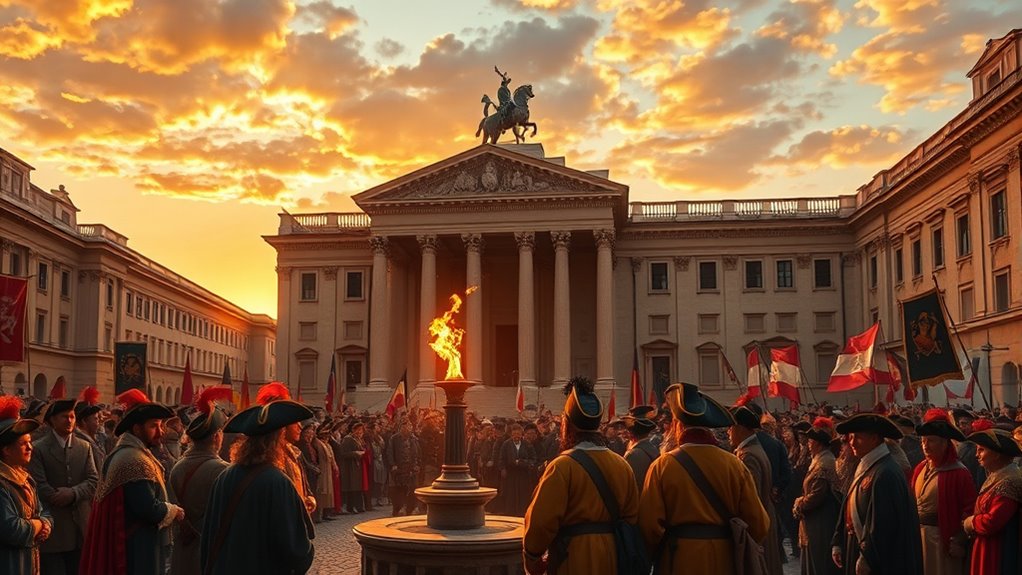
During the Enlightenment, thinkers challenged traditional authority and emphasized reason, individual rights, and scientific inquiry, fueling a wave of political and social change. You see, they questioned long-held beliefs, advocating for critical thinking and equality. This shift inspired revolutions, like the American and French Revolutions, where people fought for independence and democracy. These events dismantled monarchies and promoted ideas of liberty, citizenship, and human rights. The Enlightenment also sparked scientific discoveries that challenged old worldviews, leading to technological progress. As you observe, these movements redefined governments and societies, laying the groundwork for modern democracies. They fostered a spirit of progress, individualism, and reform that continues to shape Western culture today. This era marks the beginning of a profound transformation toward modern, rights-based societies. Additionally, the development of new technologies during this period accelerated societal change and broadened access to knowledge.
Contemporary Developments and Global Integration

Contemporary developments in the West are shaping a highly interconnected world where economies, cultures, and societies constantly influence each other. You experience this through rapid technological advances, global trade, and cultural exchanges that blur borders. Key factors include:
- The rise of the European Union, promoting economic and political cooperation.
- Technological innovations like AI, the internet, and renewable energy transforming daily life.
- Increasing migration and multiculturalism reshaping societal identities.
- Global challenges such as climate change, pandemics, and economic disparities prompting international collaboration.
- Embracing creativity and innovation is essential for developing solutions to these complex issues and adapting to ongoing change.
These developments shape policies, lifestyles, and perspectives worldwide. By engaging with these trends, you see how Western influence continues to evolve, fostering a more integrated and dynamic global community. This ongoing process defines the modern era’s cultural and economic landscape.
Frequently Asked Questions
How Did Ancient Greek Philosophy Influence Modern Western Thought?
Ancient Greek philosophy shapes your modern thinking by emphasizing reason, logic, and inquiry. You see its influence in science, ethics, politics, and education today. Think of Socrates, Plato, and Aristotle guiding your understanding of morality, government, and knowledge. Their ideas encourage you to question, analyze, and seek truth. This legacy fosters critical thinking and rational debate, forming the foundation of Western intellectual traditions that continue to influence your worldview.
What Role Did Medieval Christianity Play in Shaping Western Culture?
Medieval Christianity shaped Western culture by influencing art, literature, and education, which you see in Gothic cathedrals, religious texts, and universities. It also molded moral values, social hierarchy, and political structures, guiding laws and governance. As you observe today’s cultural norms and institutions, you’re experiencing the lasting impact of Christian beliefs, rituals, and church authority that defined societal roles and shaped Western civilization’s development.
How Did the Renaissance Impact Art and Scientific Innovation?
The Renaissance transformed art and scientific innovation by encouraging curiosity, experimentation, and a return to classical knowledge. You see artists like Leonardo da Vinci and Michelangelo push boundaries with realistic techniques and new perspectives, while scientists like Copernicus challenge old views of the universe. This era emphasizes human potential, inspiring you to explore creativity and inquiry, leading to breakthroughs that shape modern art and science today.
In What Ways Did European Exploration Alter Indigenous Societies?
European exploration drastically changed indigenous societies by introducing new technologies, animals, and crops, which transformed local economies and environments. You’d see cultures disrupted as colonizers imposed their beliefs and governance, often leading to population decline through violence and disease. Many indigenous traditions and ways of life were suppressed or altered, and you’d notice lasting effects on social structures, land ownership, and cultural identities that still influence these societies today.
How Has Globalization Affected Western Cultural Identity?
Like Icarus flying too close to the sun, globalization has lifted Western cultural identity to new heights but also risks melting its unique features. You see, it spreads ideas, media, and values worldwide, blending traditional customs with global influences. While it fosters diversity and innovation, it can also dilute local traditions, making Western culture more interconnected yet less distinct. So, your cultural identity evolves—sometimes melting, sometimes soaring.
Conclusion
Your journey through Western history reveals a tapestry woven with threads of innovation, conflict, and cultural growth. Like a river flowing through time, it shapes the world you live in today. From ancient civilizations to modern global connections, each chapter leaves its mark on your understanding of the West. Embrace this rich heritage, for it’s the foundation that continues to inspire your future, guiding you like a lighthouse in the stormy seas of change.

